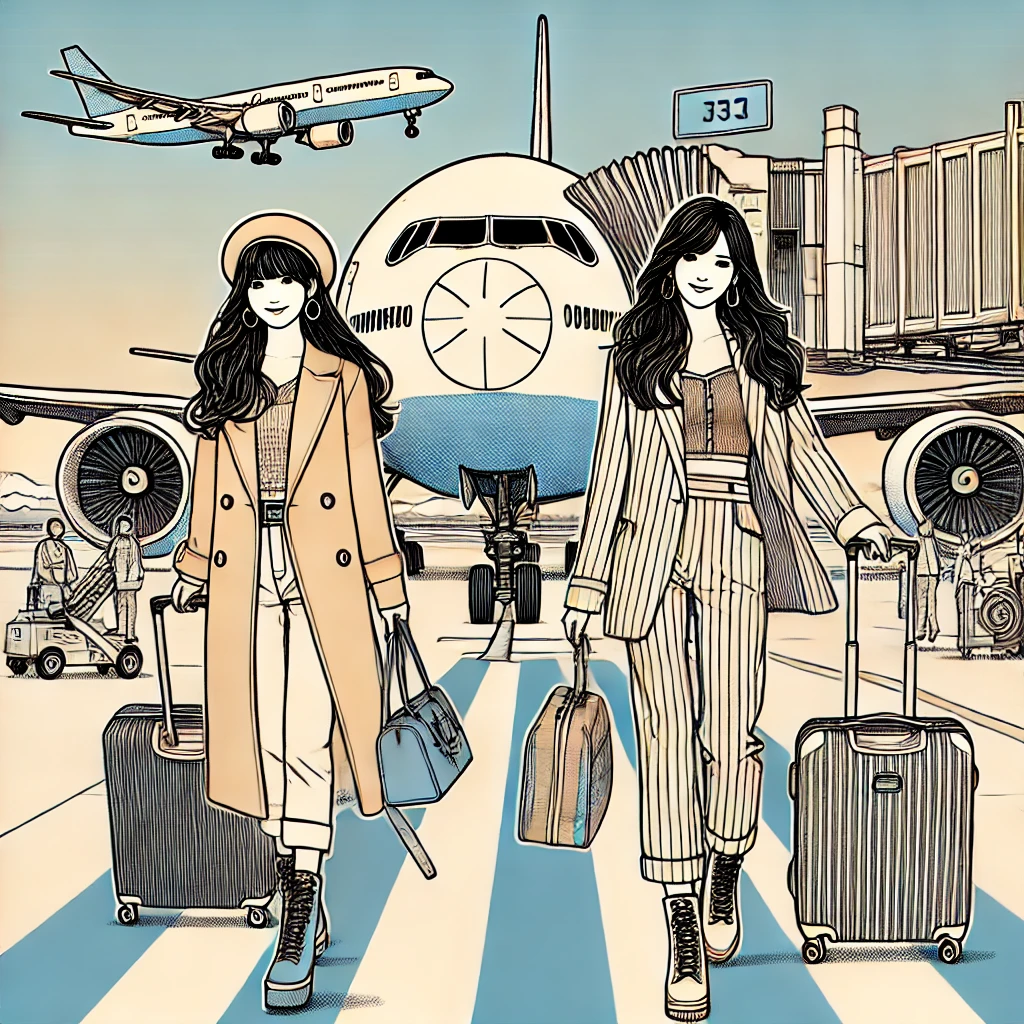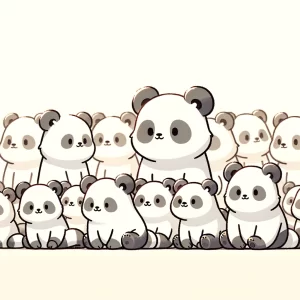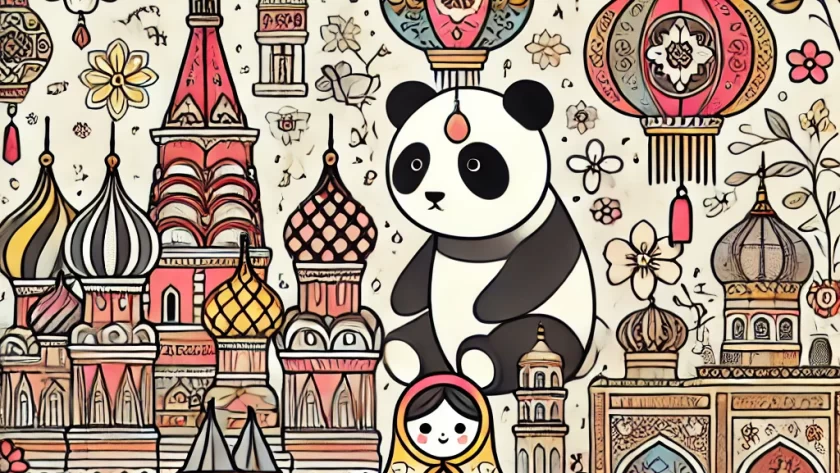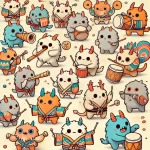アジアの純真 [Ajia no Junshin]
PUFFY [Pafī]
Words : 井上陽水 [INOUE Yōsui]
Music : 奥田民生 [OKUDA Tamio]
Puffy is a female pop music duo. The members are Ami from Yokohama and Yumi from Osaka Prefecture. Like the Pink Lady I introduced yesterday, they debuted as a produced group, but they are not called “idols.” The reason is that they don’t dance, and they maintain a relaxed, natural style without pandering to men. By the way, the name Puffy was given by Andy Sturmer of Jellyfish wiki, whom I love.
They became very popular right after their debut in 1996 and even had their own TV show. Their popularity expanded to Asia, performing concerts in Taiwan and Hong Kong. They also toured North America from 2002. After singing the theme song for the Cartoon Network anime ‘Teen Titans,’ the anime ‘Hi Hi Puffy AmiYumi,’ modeled after them, began airing nationwide in the U.S., marking their major debut in the U.S. They use the name “Puffy AmiYumi” in North America because rapper Sean Combs, who goes by the nickname Puffy, warned them.

“Ajia no Junshin” is Puffy’s debut single, composed by the famous singer-songwriter Tamio Okuda and written by Yosui Inoue. Inoue’s lyrics are often difficult and full of mysteries, which makes them interesting. This song focuses on rhythm and rhyme, so it has little meaning.
- アジア(あじあ) [ajia] : Asia
- 純真(じゅんしん) [junshin] : pure
北京 ベルリン ダブリン リベリア
pekin berurin daburin riberia
束になって 輪になって
taba ni natte wa ni natte
イラン アフガン 聴かせて バラライカ
iran afugan kikasete bararaika
- 北京(ぺきん)[pekin] : Beijing
- ベルリン [berurin] : Berlin
- ダブリン [daburin] : Dublin
- リベリア [riberia] : Liberia
- 束(たば)[taba] : bundle
- 輪(わ)[wa] : circle
- イラン [iran] : Iran
- アフガン [afugan] : Afghanistan
- 聴かせる(きかせる)[kikaseru] : let (someone) listen
- バラライカ [bararaika] : balalaika
(translation) “Beijing, Berlin, Dublin, Liberia
Bundle together, form a circle
Iran, Afghanistan, let me hear the balalaika”
This feels like a geography lesson. Despite the title mentioning Asia, there are non-Asian words.
Let’s talk a bit about kanji. As you may know, kanji characters originate from China. “北京” (“Beijing”) means “北”(=northern) and 京(=capital).” Similarly, there is “南京” (“Nanjing”) meaning “南” (=southern), “京” (=capital) in China. Influenced by China, Japan also created capital cities with similar naming. “京都 / Kyoto” was the capital. About a thousand years later, the capital moved east to “東京 / Tokyo” (“eastern capital”). The readings vary, but the kanji show the connection.
美人 アリラン ガムラン ラザニア
bijin ariran gamuran razania
マウスだって キーになって
mausu datte kī ni natte
気分 イレブン アクセス 試そうか
kibun irebu n akusesu tamesō ka
- 美人(びじん)[bijin] : beauty
- アリラン [ariran] : Arirang
- ガムラン [gamuran] : gamelan
- ラザニア [razania] : lasagna
- マウス [mausu] : mouse
- キー [kī] : key
- 気分(きぶん)[kibun] : feeling
- イレブン [irebun] : eleven
- アクセス [akusesu] : access
- 試す(ためす)[tamesu] : try
(translation) “Beauty, Arirang, Gamelan, Lasagna
Even a mouse becomes a key
Mood, eleven, access, shall we try?”
“Kibun Irebun” sounds like the convenience store “Seven Eleven,” which is nice. There was a commercial slogan before that said “Sebun, Irebun, ii kibun” (=Seven, Eleven, Good Feeling).

開けドアー 今はもう 流れでたら アジア
hirake doa- ima wa mō nagare detara ajia
- 開く(あく)[aku] : open
- ドア [doa] : door
- 今(いま)[ima] : now
- もう [mō] : already
- 流れる(ながれる)[nagareru] : flow
(translation) “Open door. Now already. If it flows out, Asia.”
The famous phrase “open sesame” from Arabian Nights is “hirake goma” in Japanese. Here, “goma” has been changed to “doa.”
白のパンダを どれでも 全部 並べて
shiro no panda o dore demo zenbu narabete
- 白(しろ)[shiro] : white
- パンダ [panda] : panda
- どれでも [dore demo] : any
- 全部(ぜんぶ)[zenbu] : all
- 並べる(ならべる)[naraberu] : line up
(translation) “Line up all the white pandas.”
In Japan, “panda” usually refers to the giant panda.
A white panda is a polar bear, isn’t it? I have no idea what’s going on.

ピュアなハートが 夜空で 弾け飛びそうに
pyua na hāto ga yozora de hajiketobisō ni
輝いている 火花のように
kagayaiteru hibana no yō ni
- ピュアな [pyua na] : pure
- ハート [hāto] : heart
- 夜空(よぞら)[yozora] : night sky
- 弾け飛ぶ(はじけとぶ)[hajiketobu] : burst
- 輝く(かがやく)[kagayaku] : shine
- 火花(ひばな)[hibana] : spark
(translation) “A pure heart, about to burst in the night sky,
shining like sparks.”
“Pyua” means pure and is often used.
火山 マゼラン シャンハイ マラリア
kazan mazeran shanhai mararia
夜になって 熱が出て
yoru ni natte netsu ga dete
多分 ホンコン 瞬く 熱帯夜
tabun honkon matataku nettaiya
- 火山(かざん)[kazan] : volcano
- マゼラン [mazeran] : Magellan
- 上海(シャンハイ)[shanhai] : Shanghai
- マラリア [mararia] : malaria
- 夜(よる)[yoru] : night
- 熱(ねつ)[netsu] : fever
- 出る(でる)[deru] : come out
- 多分(たぶん)[tabun] : probably
- 香港(ホンコン)[honkon] : Hong Kong
- またたく [matataku] : twinkle
- 熱帯夜(ねったいや)[nettaiya] : tropical night
(translation) “Volcano, Magellan, Shanghai, Malaria
Night comes, fever rises
Probably Hong Kong. Twinkling tropical night.”
The definition of a tropical night varies by country. In Japan, it refers to a night when the minimum temperature is 25 degrees Celsius (77 °F) or higher.
Seems like they got a fever during the trip. Get well soon.

開けドアー 涙 流れても 溢れ出ても アジア
ake doa. namida nagaretemo afuredetemo ajia
- 涙(なみだ)[namida] : tears
- 溢れる(あふれる)[afureru] : overflow
(translation) “Open door. Tears flow, overflow, Asia.”
地図の黄河に 星座を 全部 浮かべて
chizu no kōga ni seiza o zenbu ukabete
ピュアなハートが 誰かに めぐり会えそうに
pyua na hāto ga dareka ni meguri aesō ni
流されて行く 未来の方へ
nagasarete iku mirai no hō e
- 地図(ちず)[chizu] : map
- 黄河(こうが)[kōga] : Yellow River
- 星座(せいざ)[seiza] : constellation
- 浮かべる(うかべる)[ukaberu] : float
- 誰か(だれか)[dareka] : someone
- 巡り会う(めぐりあう)[meguri au] : meet by chance
- 流される(ながされる)[nagasareru] : be swept away
- 未来(みらい)[mirai] : future
(translation) “Float all the constellations on the Yellow River of the map
A pure heart seems about to meet someone by chance,
being swept away toward the future.”
白のパンダを どれでも 全部 並べて
shiro no panda o dore demo zenbu narabete
ピュアなハートが
pyua na hāto ga
世界を飾り付けそうに 輝いている
sekai o kazaritsukesō ni kagayaiteru
愛する限り 瞬いている
aisuru kagiri matataiteiru
今 アクセス ラブ
ima akusesu rabu
- 世界(せかい)[sekai] : world
- 飾りつける(かざりつける)[kazaritsukeru] : decorate
- 愛する(あいする)[aisuru] : love
- 限り(かぎり)[kagiri] : as long as
- 瞬く(またたく)[matataku] : twinkle
- 今(いま)[ima] : now
- ラブ [rabu] : love
(translation) “Line up all the white pandas
A pure heart
seems about to decorate the world, shining
twinkling as long as it loves
Now, access love.”
I didn’t understand the meaning at all. Maybe it’s a dream seen while delirious with a high fever from malaria? But the sound of the words is lovely. The translation probably wasn’t very helpful this time. Please sing along while looking at the word list.
By the way, some of you may notice something when watching this music video. Westerners often lump Japan together with East Asia. However, starting with this song and in many contexts, Japan is generally not included in “Asia.” It’s natural for people to view the world with their own country at the center, but from Japan’s perspective, “Asia” remains exotic and intriguing.
Tomorrow, I’ll cover a song by Yosui Inoue, who wrote these lyrics.
Thanks for reading! Feel free to comment if you have any feedback or questions.
Follow me on X.



